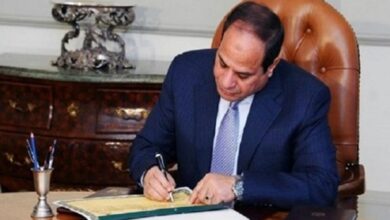Updates on the proliferating conjunctivitis (or "Pink Eye") outbreak in northern Egypt takes up the lion’s share of Tuesday's front-page news in both privately-owned and state-run newspapers. Yet the number of reported cases varies from one publication to another. While Al-Wafd opposition paper estimates the number of reported cases at 2496, state-owned Rose-al-Youssef and Al-Ahram dailies report 2206 and 2489 cases respectively.
In recent weeks, the virus has hit children in Damietta, Daqahleyya and Port Said, causing fear among parents nationwide over the possible proliferation of the disease. However, Al-Ahram state-owned daily has chosen to reassure the public that the virus is well-contained. The main headline on its front page reads: “Conjunctivitis spreads at slow rates in Mansoura and Damietta.”
Besides the contagious virus, inflammatory election updates continue to attract wide media attention. The bombshell that the liberal Wafd Party dropped Monday by announcing possible plans to boycott the elections in objection to state-imposed restrictions on its media campaigns makes headlines in a host of papers.
Al-Shorouk quotes Mohamed Mostafa Sherdy, Wafd’s official spokesman as saying, “We won’t let anyone violate our right to embark on democratic practices. If the NDP has the right to convey messages to the public, we should have the same right.”
As for Al-Wafd newspaper, almost half of the front page is dedicated to the ad saga. The main headline reads: “Wafd threaten to boycott the elections.”
The page also features a communiqué issued by the party to clear its position on the matter. Under the title: “A statement from Wafd to the nation,” the communiqué says, “Today, we saw indicators showing that the state apparatuses are not committed to hold fair elections where all parties would have an equal chance. The Egyptian television which belongs to the people refused to air our ads in which we call upon the people to exercise their political rights and join Al-Wafd Party.”
Earlier the Wafd Party had announced that it would field nearly 180 candidates in the parliamentary poll slated for 28 November.
Al-Ahram dedicates a large front-page segment to a rebuttal made by the information minister Anas al-Fiqqi. The paper quotes him as saying that: "The Supreme Electoral Commission should approve electoral campaigns ads first."
Again on the elections, Rose al-Youssef leads with a story quoting the head of the Supreme Electoral Commission Abdel Aziz Omar as saying that all candidates who run for parliament under the slogan "Islam is the solution" will be disqualified. The paper's emphasis on this statement demonstrates the ongoing verbal war the government-owned paper previously launched against the Muslim Brotherhood, which is expected to field around 150 candidates in the elections.
By the same token, the column of the paper's editor Abdullah Kamal levels the same old allegations against the nation's oldest Islamist group. Kamal insists on dismissing the group as "the beacon of terror." He writes: "The Muslim Brotherhood is the root of any group that uses violence against society."
Besides electoral feuds, privately-owned and opposition press highlight unexpected news of a reconciliation concluded between the culture minister Farouq Hosni and the head of the Culture Ministry's fine arts department, Mohsen Shaalan, who was arrested upon the disappearance of a painting by van Gogh from a state-owned museum in August. For the last couple of months, the two artists had been exchanging accusations and blaming the theft on each other.
Surprisingly enough, Hosni is quoted as saying that he will re-appoint Shaalan as his senior consultant, despite the fact that the latter was convicted of negligence and issued a three year suspended sentence earlier this month. The announcement has sent shock waves to many Egyptians who believe the ministry should refuse the convict's re-admittance.
Egypt's papers:
Al-Ahram: Daily, state-run, largest distribution in Egypt
Al-Akhbar: Daily, state-run, second to Al-Ahram in institutional size
Al-Gomhorriya: Daily, state-run
Rose al-Youssef: Daily, state-run, close to the National Democratic Party's Policies Secretariat
Al-Dostour: Daily, privately owned
Al-Shorouk: Daily, privately owned
Al-Wafd: Daily, published by the liberal Wafd Party
Al-Arabi: Weekly, published by the Arab Nasserist party
Youm7: Weekly, privately owned
Sawt al-Umma: Weekly, privately owned




